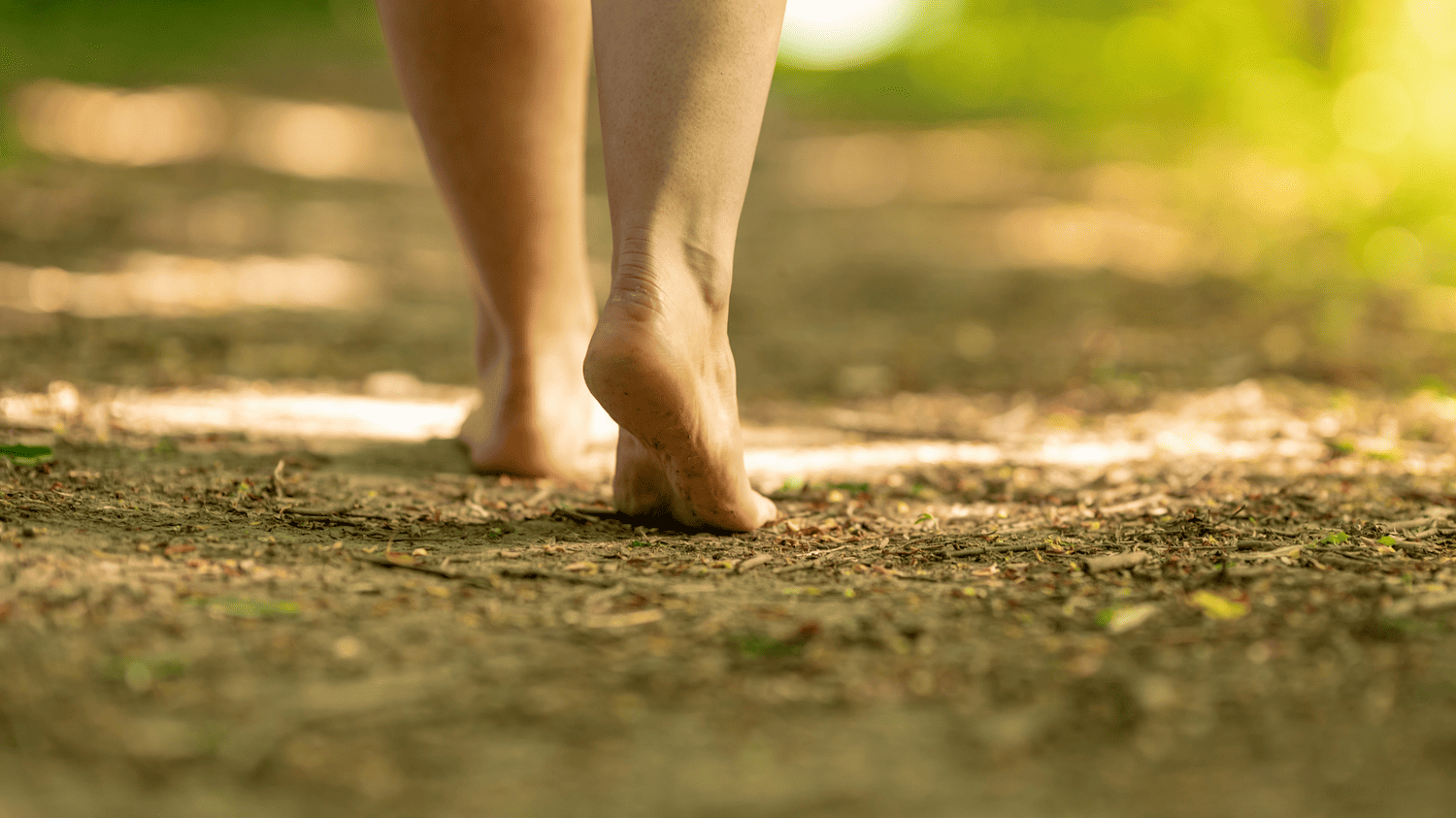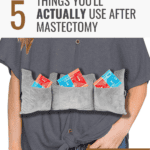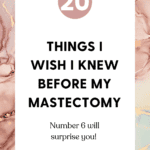What I Wish I Knew Before Mastectomy
In May of 2022, I got the news that I was facing invasive breast cancer in my right breast May of 2022. I knew right away that the only option that would give me peace of mind would be a double mastectomy, despite the fact the cancer was only currently in one breast. What is mastectomy? Mastectomy is a surgery that removes all or part of a person’s breast. If you’re facing a mastectomy, it’s normal to feel anxious and unsure about what to expect. Here are some things I wish I knew before my mastectomy.
Read: Specifics on how to prepare for mastectomy.
1. You’ll have options for reconstruction.
After a mastectomy, you can choose to have breast reconstruction surgery. If you are in the United States, health insurance providers are required to cover reconstruction surgeries. What is confusing is the sheer variety of options for reconstruction, and the names and acronyms involved. To boil it down to the basics, there are several different options for reconstruction, including implants and using your own tissue. Talk to your doctor about which option is best for you.
For me, I had a full range of reconstruction options — I was really leaning toward DIEP flap reconstruction with my own tissue, but at the healthcare facility where I was receiving care could not get me scheduled until the next calendar year. I have a High Deductible Health Plan with an extremely high deductible, and I didn’t want to have to pay another huge amount out of pocket in the next year. So I ended up with reconstruction with silicone gummy bear style implants.
You can also choose prosthetics or to just stay flat! Any option you choose is the right option for you and that is all that matters. Doesn’t matter what your friend did, what I did, what your sister did, what your mom did. It’s your choice.
2. It’s okay to feel emotional. It’s also ok to not feel emotional.
Having a mastectomy can be an emotional experience. It’s okay to feel sad, angry, or scared. Talk to your loved ones or a therapist about your feelings. You don’t have to go through this alone.
For me, this is different, I guess. I was super emotional while I was waiting to hear how bad the cancer was. The fear of the unknown and all the waiting REALLY did me in. Its sort of like having 50 tabs open on your computer…I was incredibly distracted and spending a lot of thinking about and researching the various possibilities. Swear to God I became an expert in identifying anomalies on mammogram images during that time!
Once I knew, I was actually fairly good. I did have some wistfulness about losing my breasts because I already feel like a less feminine woman. So reconstruction was important to me, else I end up feeling I look even more like one of my seven brothers (yes you read that right, I have seven older brothers!)
I did feel like I wasn’t doing the “emotional” aspect of this right. I saw so many women whose identities seem to become breast cancer, it led me to wonder what was “wrong” with me that I didn’t feel that way. Everyone’s experience is going to be different. I was anxious and scared leading up to it, but my situation was such that I felt fairly good about my prognosis and outcomes and trusted I had great medical care.

3. You’ll need to rest after surgery.
After your mastectomy, you’ll need to rest and take it easy for a while. Your body needs time to heal. Don’t be afraid to ask for help from friends or family members.
I expected to need to lay in bed for days after, but for me (your mileage may vary) it wasn’t like that at all. This is something I really wish I had understood better beforehand, because the “rest” you will need is going to be very different for each person. There is physical rest, and there is mental rest. For the prior three months, because I had been going through an incredibly long process to get the specifics of my cancer diagnose and then there was a wait to get my surgery, I was wound up tighter than a drum. This result in intense mental fatigue. Like outrageously intense mental fatigue.
My surgery was a same day surgery (which just blows my mind…double amputation is a same day surgery…) and that very night I demanded to go to Wendy’s and have a Junior Baconator. The next day, because we were staying in a hotel for the weekend just to make sure I was in Rochester (I went to the Mayo Clinic) in case there were issues post-surgery, That day I felt fine to walk about 4 city blocks to dinner with my husband, brother and sister-in-law.
Keeping your pain well-managed is critical to the early physical recovery phase, and getting lots of walking in. Walking is always your friend when recovering after a surgery.
Just a word about going back to work. Your workplace needs to understand that recovery and medical leave look different for every person. You will likely not be in bed or stuck on the couch beyond a couple days. You will be tired and mentally fatigued well after the initial week or two of post-op recovery. You recover in whatever way works best, based on your doctor’s guidance. That can look very different for different people.
4. You will probably have drains.
I say probably, because, well, I’m not your doctor. But most women end up with JP (Jackson-Pratt) drains. These are tubes that are attached into cavities in your surgical area where fluid collects with small holes that allow liquid in.
These are stitched in place with a couple of stitches and then that tube runs out and is attached to a bulb that you squeeze so that it causes suction on the tube to get the fluid to drain out. Your doctor or nurse will show you how to care for your drains.
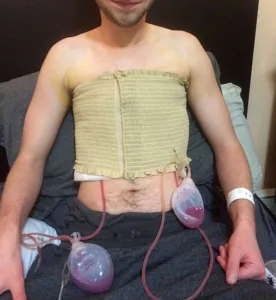 Post Operative Jackson Pratt Drains (Yes, men have mastectomies too!)
Post Operative Jackson Pratt Drains (Yes, men have mastectomies too!)
“File:Post-operative Jackson-Pratt Drains.JPG” by Intellec7 is licensed under CC BY-SA 4.0 .
5. Your range of motion may be limited.
After surgery, you may have limited range of motion in your arm on the side of your surgery. Your doctor may recommend physical therapy to help improve your range of motion.
I found it was worse on the side where they removed the sentinel nodes for biopsy. I did the stretches and exercises as I was given by my Mayo surgeon. If you have radiation, this will also impact your range of motion. I didn’t have radiation so I don’t have that experience to share, but would welcome any comments about what would help to add to this article from those of you who have had radiation.
6. You may have phantom breast pain.
Some people experience phantom breast pain after a mastectomy. This is when you feel pain or discomfort in your breast even though it’s no longer there. Talk to your doctor if you’re experiencing phantom breast pain.
But you know what really blew my mind? I didn’t have phantom pain, I had phantom nippliness. You know that feeling you get when ya get cold? Yep. That feeling. All the time. Still have it, and I’m like 9 months out almost from the surgery. I also experienced the feeling of milk let-down, if you know what that feels like. Very weird. The body and the brain are a very strange pair.
7. You’ll need to wear a special bra for a while.
After surgery, you’ll need to wear a special bra that provides support and compression to your chest. Your doctor or nurse will give you instructions on how to wear and care for your bra.
I received two bras from my surgeon. I woke up in one after surgery and was given one to wear while one was in the wash. It hooked in the front and that was amazing because you will not be able to get your hands back behind yourself too easily. The bras have loops on them to attach your drains as well. Those are not wonderfully comfortable, so as soon as my drains were out I switched to these bras:Wanayou Front Zip Bra

8. You may feel different about your body.
Having a mastectomy can change the way you feel about your body. It’s important to remember that you are still beautiful and strong. You may want to consider talking to a therapist or joining a support group to help you cope with these changes.
I did neither of these things. I don’t know if I’m emotionally damaged or what, but I didn’t feel the need. While I did want to have boobs again, I also didn’t feel too terrible. I just wanted to have normal feminine lumps upfront again. I don’t think I’m too worried about nipple reconstruction. I do occasionally feel rather rueful when I look in the mirror. It’s a big alteration in our bodies, and means a lot of different things to different people. If your boobs were a big part of your feminine identity, you’re definitely going to feel some strong feelings about the changes in your body, and that is ok (refer to #1).
9. You may need to adjust your wardrobe.
After a mastectomy, you may need to adjust your wardrobe to accommodate your new body shape. You may need to wear different types of clothing or bras. Don’t be afraid to experiment and find what works best for you.
Right after mastectomy, you’re going to be told not to lift your arms up over your head and be slow and careful about movements that way. Some women get really strict instructions about basically acting like they have T-Rex arms. At the Mayo Clinic, this was not the advice. Just to minimize lifting my arms over my head and move very slowly and don’t continue if I felt pain. During those early weeks though, you will probably feel more comfortable with shirts that button up. I had virtually no button up shirts except for a couple of dress shirts which I sure wasn’t going to wear, so I got a couple of the shirts below, and alternated these with flowy t-shirts that I didnt have to lift my arms above my shoulders to get my arms in the arm holes.

While you have drains in, you may also wish to wear a drain apron if you don’t want them hanging by your sides attached to your surgical bra (looks weird and lumpy). Some women swear by going to Home Depot and picking up one of their tool aprons.
I wanted something a little more subtle and picked this set up that included both a drain apron and a little mesh bag to put my drains in during showers.
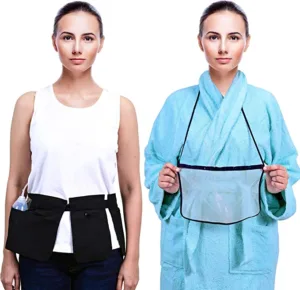
10. You’ll need to take care of your incision site.
After surgery, you’ll have an incision site that needs to be cared for. Your doctor or nurse will give you instructions on how to clean and care for your incision site. It’s important to follow these instructions to prevent infection.
When you shower, you may wonder how to take care of your drains. At the hospital, they gave me
11. You may have trouble sleeping.
After a mastectomy, you may have trouble sleeping due to discomfort or anxiety. Talk to your doctor about ways to manage your discomfort and anxiety. They may recommend medication or relaxation techniques.
You’ll want to sleep upright or partially upright immediately after surgery. I was SOOOOOO lucky and we have a Split King Adjustable Bed. That is not practical for many people, so the other options are to sleep in a recliner or use a wedge pillow with your other pillows on top of it. I used a mastectomy pillow that wraps around and found it very comforting. I used it mostly to make sure my dogs didn’t jump on my chest.


12. You’ll need to take it easy for a while.
After surgery, you’ll need to take it easy and avoid strenuous activity for a while. Your doctor will give you instructions on when it’s safe to resume your normal activities. You’ll have restrictions while you are on pain meds (no driving) and weight lifting restrictions — usually no more than 5-10 pounds of lifting depending on how far out you are after surgery.
I tried to walk every day and keep it under 5-7,000 steps. During the first couple of weeks my doctor wanted to make sure I wasn’t walking too much.
13. You may have trouble with intimacy.
After a mastectomy, you may have trouble with intimacy or feel self-conscious about your body. It’s important to communicate with your partner about how you’re feeling and what you’re comfortable with. You may want to consider seeing a therapist or joining a support group to help you navigate these changes.
I’m going to leave this one right here because everyone’s experience will vary. Not sure its a topic I’m ready to talk about yet!
14. You’ll need to attend follow-up appointments.
After your mastectomy, you’ll need to attend follow-up appointments with your doctor. These appointments are important to monitor your recovery and make sure everything is healing properly. It’s important to keep these appointments and follow any instructions your doctor gives you.
Hopefully this won’t be as much of a pain as it was for me. We live 3.5 hours away from the Mayo Clinic in Rochester, MN. I’m grateful for the ability to be able to get my care there, but it was and is a haul to get down there for appointments. Once you get past the immediate post surgical phase where they are actively looking at the incisions, you may be able to switch some of your visits to video visits. I just had what is probably my last oncology visit at Mayo for a while. Its April 2023, and my surgery was in August of 2023 for context.
15. You may need to adjust your exercise routine.
After a mastectomy, you may need to adjust your exercise routine to accommodate your recovery. Your doctor or physical therapist can help you develop an exercise plan that’s safe and effective for you.
I’m a lethargic lump normally, so you may have to talk to people who actually exercise to get more advice in this area. What I can tell you, is that I walked about 5,000 – 7,000 steps a day in the first few weeks after surgery. I probably walked less after that. Yeah, I suck. Immediately after surgery, I have heard that a little bit of walking helps circulate your blood around your body and aids in healing. So I am generally better about walking after a surgery than normal. I really should be more active.
16. You may experience lymphedema, cording or both.
Lymphedema is a condition where excess fluid builds up in your arm on the side of your surgery. This can cause swelling and discomfort. Your doctor may recommend exercises or compression garments to help manage lymphedema.
I have not experienced lymphedema, but I did experience something called cording for a while after. I’ll write a blog article about this at some point, but there is physical therapy available for both lymphedema and cording. Lymphedema becomes more likely the more lymph nodes they remove. I just had the minimal 2-3 lymph nodes removed.
Here is a weird thing I wish I had known before mastectomy: You may be told to avoid blood draws and blood pressure readings in the arm which had the lymph nodes removed, as it may contribute to lymphedema. At Mayo, with the minimal number of lymph nodes I had removed for biopsy I was told this probably would not be an issue for me, but I figure, can’t hurt, might help.
17. You’ll need to be patient with your recovery.
Recovering from a mastectomy takes time. It’s important to be patient with yourself and allow yourself time to heal. Don’t push yourself too hard or try to do too much too soon.
Special advice for people with stressful jobs. Don’t let anyone bully you into coming back any sooner than your doctor advises or clears you, or what you can financially afford. This process is SO much more than the surgery itself. For weeks (or months in my case) you may feel unrelenting stress about what your future will hold. This takes just as much of a toll on you as the surgery will. At least it did for me.
I felt really guilty for taking six weeks off and that sucks. Comments were made by people I work with about taking a restful vacation during my recovery time off and having the audacity <gasp> to share photos of that on social media. Whatever. My vacation plan had been approved by my doctor. You do you boo. Your recovery plan is between you and your doctor, no one else.

18. You may need to make lifestyle changes.
After a mastectomy, you may need to make lifestyle changes to reduce your risk of cancer recurrence. This may include changes to your diet, exercise routine, and stress management techniques.
For many of us, this may mean moving on to radiation or chemotherapy. (Or maybe you had chemo prior to surgery). Your lifestyle may also include medication to reduce the risk of breast cancer, like Tamoxifen.
Read More: Tamoxifen after Breast Cancer
19. You’re not alone.
Going through a mastectomy can feel isolating, but you’re not alone. There are many support groups and resources available to help you through this journey. Don’t be afraid to reach out for help and support.
I am not that into Facebook anymore, but I relied on a couple of ahhh-mazing Facebook groups for support before, during and after Mastectomy. Here you will find lots of women (and maybe men depending on the groups you join) who will share experiences.
One word of caution: Online groups tend to bring out the extreme experiences. You’ll see more people talking about the good things than the bad, because people seek out support when they are going through tough experiences. Keep an open mind about what your experiences will be, and be the kind of person who shares GOOD experiences in these groups too!
Double/Single Mastectomy Discussion And Support Group
Tamoxifen Support Group (and Raloxifene) for Breast Cancer
20. You’re strong and resilient.
Having a mastectomy can be a difficult and emotional experience, but it also shows how strong and resilient you are. You have the strength to get through this and come out stronger on the other side.



